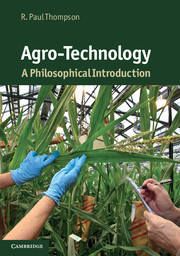Book contents
- Frontmatter
- Contents
- List of figures
- List of tables
- Preface
- Introduction
- 1 Scientific background
- 2 Application of genetics to agriculture
- 3 Philosophical and conceptual background
- 4 The controversy
- 5 The controversy
- 6 The controversy
- 7 The organic alternative
- 8 Impacts on low- and middle-income countries
- Concluding remarks
- Bibliography
- Index
5 - The controversy
Purported benefits
Published online by Cambridge University Press: 05 June 2012
- Frontmatter
- Contents
- List of figures
- List of tables
- Preface
- Introduction
- 1 Scientific background
- 2 Application of genetics to agriculture
- 3 Philosophical and conceptual background
- 4 The controversy
- 5 The controversy
- 6 The controversy
- 7 The organic alternative
- 8 Impacts on low- and middle-income countries
- Concluding remarks
- Bibliography
- Index
Summary
Since 2005, when the first commercial plantings of GM crops occurred, farmers have been the principal immediate beneficiaries: higher yields, lower input costs and so on. There have been benefits to consumers and to the environment but these are less visible. Consumers have benefited from a secure supply of food at stable or falling prices – even though, for example, the cost of oil-derived products (e.g. fuel – used in tractors and transport trucks – and artificial fertilisers) has increased significantly. The environment has benefited from reduced pesticide and herbicide spraying, reduced use of fuel in tractors (fewer herbicide sprayings required and no pesticide spraying), lower groundwater contamination, and zero tillage (reducing wind and water erosion of soils). There are, of course, claims of harms associated with GM crops as well as challenges to the claimed benefits; these are examined in the next chapter. The next generation of GM crops promises to have more tangible benefits for consumers (e.g. higher expression of specific vitamin enrichment and long-chain Ω-3 fatty acids – an important cardiac health benefit), for the environment (e.g. draught tolerance – hence, less irrigation water use – and lower fertiliser requirements – nitrogen fertiliser, for example, which is a significant source of greenhouse gases) and for farmers in low- and middle-income countries. In this chapter, I explore three purported benefits of GM crops.
- Type
- Chapter
- Information
- Agro-TechnologyA Philosophical Introduction, pp. 137 - 151Publisher: Cambridge University PressPrint publication year: 2011

